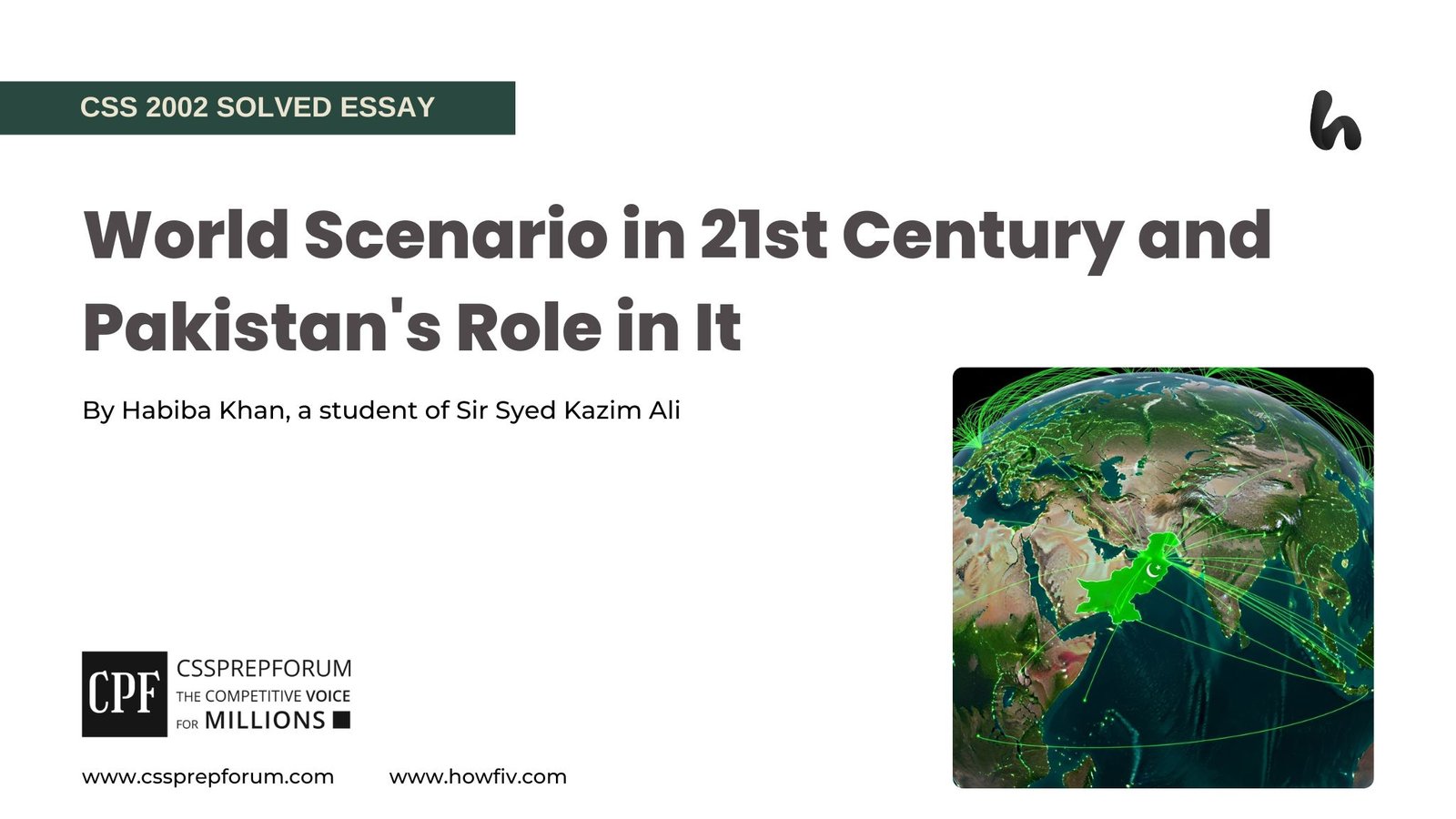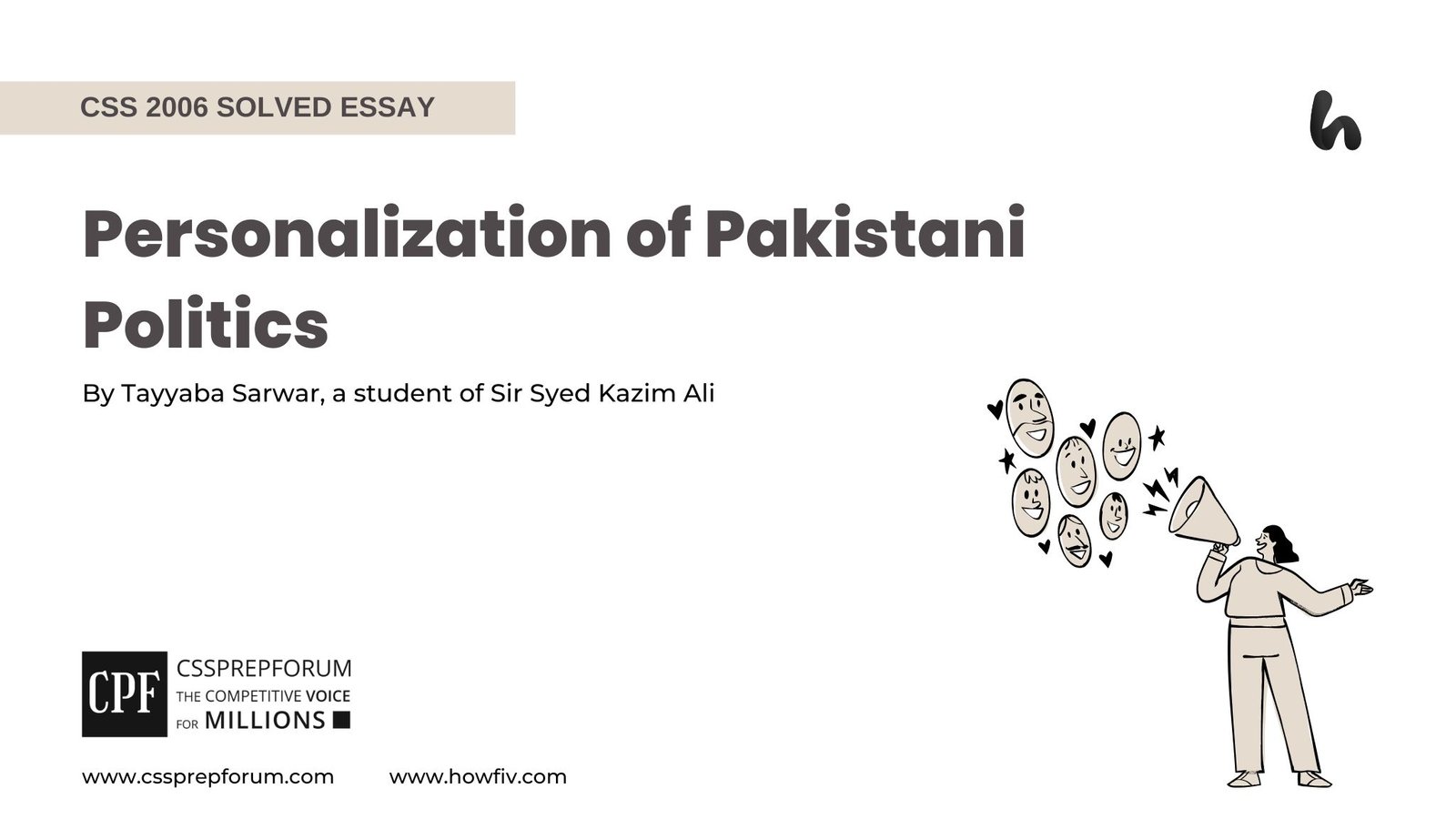PMS Ministerial Solved Essays | Local Government is the Basis of a Successful Democratic System
This PMS Ministerial essay “Local Government is the Basis of a Successful Democratic System” is attempted by Umar Khitab on the given pattern, which Sir Syed Kazim Ali teaches to his students, who have consistently been qualifying their CSS, and PMS essays. Sir Syed Kazim Ali has been Pakistan’s top English writing and CSS, PMS essay and precis coach with the highest success rate of his students. The essay is uploaded to help other competitive aspirants learn and practice essay writing techniques and patterns.
How To Attempt 25-Marks PMS Ministerial Essay?
Most aspirants think a PMS Ministerial Essay is just a shorter version of a CSS or PMS essay; but the truth is, its structure, scoring logic, and examiner expectations are very different. In fact, in just 80–100 words, your introduction alone can decide whether you pass or fail. The outline you write, the way you frame your thesis statement, and the precision of your arguments in body paragraphs all combine to make or break your score.
If you want to see solved PMS Ministerial Essays from top scorers, learn the exact format Sir Syed Kazim Ali teaches his students, and uncover the step-by-step approach that officers themselves used to qualify, click the links below before you try to attempt an essay by yourself.

Local Government is the Basis of a Successful Democratic System
Outline
Introduction
Although central governments can implement nationwide policies without relying on local bodies, strong local governments address community needs efficiently, enhance political participation, drive grassroots economic growth, and promote social cohesion, making them the indispensable foundation of a successful and truly representative democratic system.
Defining local government and its democratic significance
What makes local government the basis of a successful democracy?
- Addressing local needs efficiently
- Evidence: In New Zealand, the “Local Water Done Well” policy enacted in 2024 shifted control of water services to local councils, improving efficiency and responsiveness
- Enhancing political participation
- Evidence: In Greater Manchester 2024 local council elections, turnout reached 41 %, the highest among local authorities in the region, demonstrating meaningful public involvement
- Fostering economic development at grassroots
- Evidence: China’s township governments have driven rural economic growth, lifting millions above the poverty line.
- Promoting social cohesion and conflict resolution
- Evidence: Rwanda’s local councils play a central role in post-genocide reconciliation, resolving thousands of community disputes annually.
Can democracy succeed without strong local governments?
- Counter Argument: Central governments can directly implement policies nationwide, bypassing local bodies to ensure uniformity.
- Refutation: This top-down approach often ignores local realities, leading to inefficiency and public disengagement.
Conclusion

Democracy thrives when governance is brought closer to the people, ensuring that citizens have a direct say in decisions that shape their daily lives. Undeniably, a country’s local government is the most immediate and accessible level of governance, bridging the gap between state authority and community needs. As the foundation of participatory democracy, it empowers citizens, fosters accountability, and tailors services to local realities in a country. However, some argue that centralized governance can achieve the same goals through uniform policies. However, global experiences reveal that robust local governments remain indispensable for making democracy effective, equitable, and sustainable in the long run.
Before jumping ahead, it is essential to first define what local government entails and why it is central to democratic systems. Local government refers to elected bodies at the municipal, district, or village level that manage community affairs, deliver public services, and promote development within their jurisdictions. It derives legitimacy from its direct connection to citizens, enabling it to identify needs swiftly and implement context-specific solutions. Historically and constitutionally, nations have recognized their significance as a vehicle for participatory governance and as a means to uphold democratic ideals. Thus, local government works not only as an administrative mechanism but also as a democratic safeguard that strengthens the relationship between the state and its people.
Moving forward towards its democratic functions, one of the most significant contributions of local governments is their capacity to address community needs with precision and speed. Their proximity to citizens allows them to identify and respond to issues more effectively than central authorities. For instance, in New Zealand, the “Local Water Done Well” policy enacted in 2024 shifted control of water services to local councils, improving efficiency and responsiveness. This example highlights how devolving authority empowers local bodies to design targeted solutions, thus fostering public trust and ensuring better service delivery.
Similarly, local governments play a significant role in enhancing the political participation of a country. In fact, by providing citizens greater opportunities to engage in governance, they cultivate a politically aware and active society. For instance, in the 2024 Greater Manchester City council elections, voter turnout reached 41 per cent, the highest among local authorities in the region. This reflects meaningful public involvement and demonstrates that when people believe their voices can influence policy at the local level, they are more likely to participate. Hence, such engagement is indispensable for a country sustaining a vibrant and resilient democratic system.
In addition to political engagement, local governments play a central role in fostering grassroots economic development. Undoubtedly, their close understanding of local resources and challenges enables them to formulate well-organized economic strategies that national policies might overlook. To elaborate, in China, township governments have driven rural economic growth, lifting millions above the poverty line through infrastructure projects, agricultural reforms, and micro-enterprise support. This emphasises how localized economic governance can produce lasting improvements in livelihoods, thus contributing to national prosperity and stability.
Lastly, strong local governments are instrumental in promoting social cohesion and resolving conflicts in a country. Truly, by acting as forums for dialogue and mediation, they strengthen communal harmony within communities. For example, Rwanda’s local councils have been pivotal in post-genocide reconciliation, resolving thousands of community disputes annually. This grassroots approach to conflict resolution has rebuilt trust, fostered peace, and helped prevent future tensions among Rawadian people. Hence, it proves that effective local governance is not only about service delivery but also about nurturing societal unity.
However, critics argue that democracy can succeed without strong local governments as central authorities can implement uniform policies nationwide to maintain fairness and efficiency. While this approach may seem effective, it often overlooks local realities. Indeed, top-down governance risks producing policies disconnected from the specific needs of communities, leading to inefficiency and public disengagement. And the global examples, such as Sweden and New Zealand, demonstrate that empowering local governments leads to more responsive services and higher citizen satisfaction, hence reinforcing the argument that decentralization strengthens democracy rather than weakening it.
In a nutshell, local government is far more than an administrative necessity; it is the backbone of a successful democratic system. By addressing local needs efficiently, enhancing political participation, driving grassroots economic growth, and promoting social cohesion, it ensures governance remains relevant and inclusive. The experiences of New Zealand’s service delivery reforms, Greater Manchester’s electoral engagement, China’s rural transformation, and Rwanda’s reconciliation efforts all highlight the transformative potential of strong local governance. Hence, the choice for democratic nations is clear: invest in empowering local governments today to ensure democracy thrives not just in principle, but in practice.
PMS Ministerial Solved Past Papers’ Essays
Whether you want to learn the art of writing PMS Ministerial Essays or explore solved past papers essays, you’ll find everything you need on the Cssprepforum and Howtests websites.
All essays have been authored by students of Sir Syed Kazim Ali, aspirants who are either essay top scorers or serving officers. In addition, you can access a wealth of guiding articles on essay writing by Sir Kazim, designed to help you develop the skills necessary to write winning essays for competitive exams.
For your convenience, we’ve attached the links below. Click any to start reading and take your preparation to the next level.
| How to Write PMS Ministerial Essay – Complete Format |
| Writing the PMS Ministerial English Essay |
| How to Master PMS Ministerial Essays |
| PMS Ministerial Essays |
| PMS Ministerial Solved Past Papers Essays |
PMS Ministerial Solved Essays
| 1- | Good Governance (2010) |
| 2- | Islam and Brotherhood of Mankind (2010) |
| 3- | Literature is the Essence of Life (2010) |
| 4- | Role of Responsible Media (2010) |
| 5- | A Bird in Hand is Worth Two in the Bush (2016) |
| 6- | He Who Opens a School Door, Closes a Prison (2016) |
| 7- | Local Government is the Base of a Successful Democratic System (2016) |
| 8- | Clean Environment is Good Environment (2016) |
| 9- | Human Resource Development is a Key to Progress and Prosperity (2019) |
| 10- | High Growth Rate in Population is Adversely Affecting our Economic Progress (2019) |
| 11- | Public School System in Pakistan (2019) |
| 12- | Importance of Preventive Healthcare (2019) |
| 13- | National Integration (2021) |
| 14- | Of All Forms of Servitude, the Intellectual is the Most Degrading. Expand This Statement by Showing its Complete Significance and also Attempt to Justify or Disprove it. (2021) |
| 15- | Advantages and Disadvantage of Facebook (2021) |
| 16- | Single National Curriculum: Prospects and Problems (2021) |
| 17- | Impacts of Globalization on Developing Countries |












